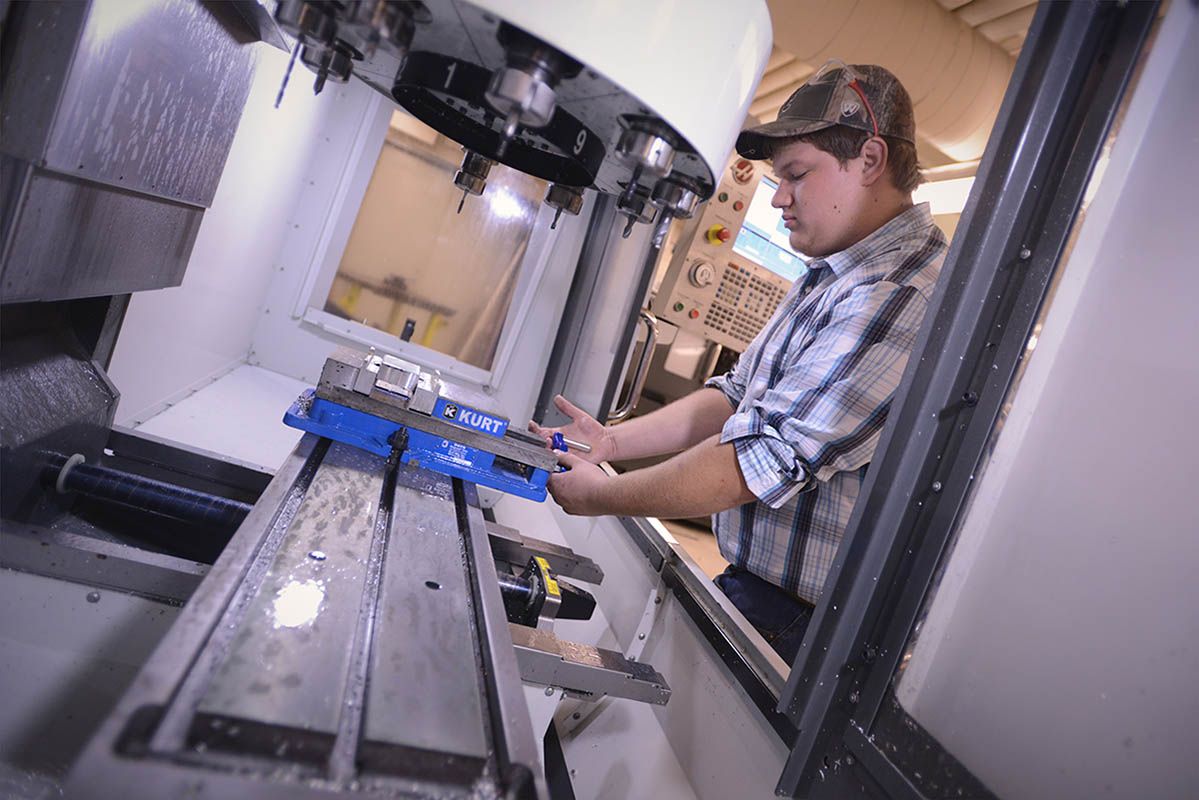
Contact a Pensacola State College Advisor, this program's Department Head, or Program Contact for assistance in planning your program of study.
RELATED LINKS
SITE LINKS
SEARCH PROGRAMS
INTRODUCTION
The Mechanical Design & Fabrication specialization prepares students for careers in CNC machining, mechanical design, and metal fabrication. The program offers unique technical skills and opportunities for employment in local and regional industries. The coursework provides the basis for employment in a variety of manufacturing areas some of which include Computer Aided Design (CAD), Computer Aided Manufacturing (CAM), Computerized Machining (CNC), Production Welding; and Metal and Composite Fabrication. Industry standard software taught in this program includes AutoCAD, PlasmaCAM, MasterCam, and SolidWorks. A major objective of this program is to teach proficiency in CNC programming, set-up, and operation of CNC machining and turning centers to prepare students for employment in this high demand industry. To accomplish this task, the lab is equipped with Haas CNC milling and turning machining centers, Camtech CNC gantry router, CNC plasma cutting, metal fabricating, and welding equipment. Additional skills taught include precision measuring and Rapid prototyping using an EMS 3D printer. Included in the Engineering Technology A.S. degree are five college credit certificates, these “micro-degrees” are CNC Machinist / Fabricator, CNC Machinist Operator / Programmer, CNC Composite Fabricator/Programmer, Mechanical Designer Programmer, and Engineering Technology Support Specialist. Most can be completed in one semester. Students can also acquire practical working experience by participating in Co-op opportunities with local manufacturers.
The Associate in Science in Engineering Technology – Mechanical Design and Fabrication includes College Credit Certificates in:
- CNC Composite Fabricator / Programmer
- Machinist / Fabricator
- CNC Machinist Operator / Programmer
- Mechanical Designer / Programmer
Students in this program are encouraged to apply to graduate with each certificate as the requirements are satisfied.
You are strongly encouraged to contact the Engineering Technology Department for assistance in your decision to take coursework and in the planning of your program of study.
BEYOND GRADUATION
The Mechanical Design & Fabrication degree prepares a student for a career in the computerized machining and fabrication industry. The core courses provide a basis for employment in a variety of manufacturing areas some of which include Computer Aided Design (CAD), Computer Aided Manufacturing (CAM), Computerized Machining, Production Welding, Metal Fabrication, computerized millwright in wood, plastics and composite materials. Specific software used in this technical program include AutoCAD, PlasmaCAM, MASTERCAM-X Mill, Lathe, Router and SolidWorks. In this high demand industry, our objective is to teach students proficiency in the set-up and operation of state of the art CNC machining and turning centers. The students will use a Haas VF-2 CNC Mill, Haas TL-1 CNC Lathe, a CNC plasma cutter and a CNC gantry table router. The Mechanical Design & Fabrication program provides students with unique skills and opportunities for employment in local and regional industries. A student can also acquire practical working experience by participating in our Co-op opportunities with local manufacturers.
Occupations
Architectural and Engineering Manager
Plan, direct, or coordinate activities in such fields as architecture and engineering or research and development in these fields.
Validation Engineer
Design or plan protocols for equipment or processes to produce products meeting internal and external purity, safety, and quality requirements.
Energy Engineer
Design, develop, or evaluate energy-related projects or programs to reduce energy costs or improve energy efficiency during the designing, building, or remodeling stages of construction. May specialize in electrical systems; heating, ventilation, and air-conditioning (HVAC) systems; green buildings; lighting; air quality; or energy procurement.
Manufacturing Engineer
Design, integrate, or improve manufacturing systems or related processes. May work with commercial or industrial designers to refine product designs to increase producibility and decrease costs.
Teach courses pertaining to the application of physical laws and principles of engineering for the development of machines, materials, instruments, processes, and services. Includes teachers of subjects such as chemical, civil, electrical, industrial, mechanical, mineral, and petroleum engineering. Includes both teachers primarily engaged in teaching and those who do a combination of teaching and research.

 PirateQ
PirateQ 